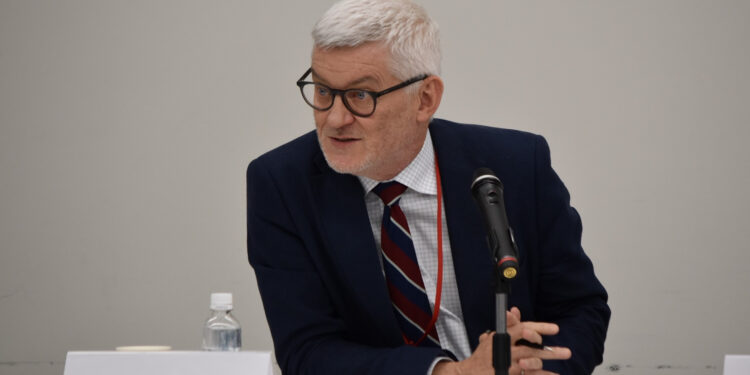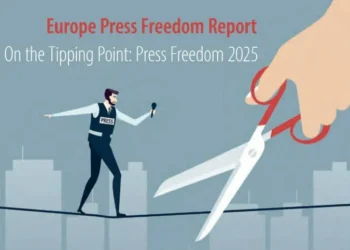For the first time in over a decade, the US has a stake in the South Caucasus, – says Dr. Neil Melvin, Director of International Security Studies at the Royal United Services Institute (RUSI), in a wide-ranging conversation with RFE/RL’s Georgian Service. He calls the newly signed TRIPP agreement between Armenia and Azerbaijan “very clearly a breakthrough,” but warns it is “a step, not the end of the story.” He explains how the US-brokered 99-year transit corridor could redraw the strategic map of the South Caucasus, why Iran and Russia may resort to sabotage rather than open opposition, and how the deal feeds into both Washington’s regional ambitions and Ankara’s Turkic-world strategy. Melvin also assesses Donald Trump’s increasingly viable Nobel Peace Prize bid, and delivers a pointed warning to Georgia, which, he says, “risks being marginalized” if it fails to adapt to the new Middle Corridor reality.
What do we know at this point? What does the TRIPP agreement entail, and what could its possible implications be for the geopolitical paradigm of the South Caucasus?
This is very clearly a breakthrough in relations between Armenia and Azerbaijan. They’ve been in something of a diplomatic dance for some time now over how to finalize and move forward in the peace process, but they hadn’t been able to overcome that final hurdle. What President Trump has done is bring them together and, through this agreement on a transit corridor—to be administered by US companies for 99 years—allowed both sides to take a step forward.
But we should be clear: this is a step, not the end of the story. There are still issues down the road that will need to be resolved. We’ve also seen some negative reaction in the region, notably from Iran—even outright hostility to it. Russia is in a complicated position and has decided, for now, not to formally oppose it. The agreement has been signed, but its real significance will depend on how it’s implemented—both within Armenia and Azerbaijan, and more widely in the region. It will take time before we can see the full implications.
Critics have pointed to President Trump’s perceived mercurial nature, questioning whether the agreement will actually be followed through on by his administration.
I’m a little more optimistic, for a number of reasons. First of all, this hasn’t come out of the blue. It builds on a lot of work already done by the Biden administration on this issue—the groundwork was already laid. I think Secretary of State Rubio personally understands the importance of this. Below the White House, the State Department and probably the Pentagon also have their own interests in seeing this work and be implemented.
We still don’t know exactly how this 99-year lease will function—whether it’s a purely commercial or a state-backed arrangement. Questions remain about who will be responsible for ensuring security, who will carry out border and customs checks, and similar operational matters. Those details will have to be clarified.
Let’s expand on the manifold US interests you mentioned. Why is this so important for Washington?
Since the 2008 Russia–Georgia war, we’ve seen a steady decline in US interest in the South Caucasus and, more broadly, the Caspian region. The post-Cold War idea of integrating the South Caucasus into a European order has collapsed. What this agreement does is create a renewed US stake in the South Caucasus, but this time it isn’t about the European order. That moment has passed.
Now it’s about economic and trade interests—about building the Middle Corridor that links Europe and Turkey through the South Caucasus to Central Asia. Geopolitically, it allows the US to insert itself between Iran and Russia, which fits with the Trump administration’s broader thinking on how to disrupt the coalitions forming around Russia, China, North Korea, and Iran.
For the first time in over a decade, we are seeing the prospect of a sustained US interest in the South Caucasus. This strengthens a broader trend toward a multi-vector region—not just the established actors like Russia, Iran, and Turkey, but now also the United States, Europe, China, and the Gulf states. That diversity of engagement helps the countries of the region bolster their sovereignty, giving them options so they aren’t forced into alignment with one power simply because no alternatives exist.

You said this was a step toward a final peace agreement between Armenia and Azerbaijan. President Aliyev said in Washington that “there should be no doubt that any of the parties involved will take a step back.” How big a step are we talking about here? Is this a leap?
It’s not quite a leap, but it’s a significant step forward. There are still complex issues to be resolved. Azerbaijan wants Armenia to amend its constitution so that there is no indirect claim to territory beyond its current borders—and particularly not to Karabakh. That will be difficult, especially as we approach next year’s elections, which could well be disrupted, possibly by Russia or others seeking to shape the outcome. This could become a major election issue.
On the Azerbaijani side, Armenia still wants ethnic Armenians who were forced out of Karabakh to have the right to return. Another key question is whether Turkey will now open its border with Armenia. If steps are taken in the right direction, things could move quickly, and we could soon be looking at a very different situation in the region.
If Turkey does open its border, that would make Armenia a fully-fledged part of the Middle Corridor, correct?
Exactly. It would change the political dynamic across the South Caucasus. There will certainly be attempts to spoil it—from Russia, Iran, and perhaps others—but with US backing, we may see major changes.
Turkey, perhaps the biggest winner from this deal, also stands to gain enormously. With this corridor opening, Nakhchivan—the Azerbaijani exclave bordering Turkey—becomes a transit link to mainland Azerbaijan and across the Caspian. This feeds into Turkey’s larger strategic vision as a Turkic-world actor: building economic corridors through the South Caucasus and across the Black Sea to Central Asia, bypassing both Russia and Iran, and positioning itself as a leading regional power.
Let’s look at those potential spoilers. What can Russia and Iran actually do to retaliate?
Iran is in the most difficult position, particularly after the bombing of its nuclear facilities and the war. Now it’s suddenly facing the prospect of the United States sitting right on its border for 99 years—just a few kilometers from the northern Iranian frontier.
It also complicates the embryonic north–south corridor that Iran and Russia have been trying to forge since the Ukraine war began. With an east–west corridor backed by the United States now cutting right across, the project doesn’t disappear entirely, but anything moving along those routes will potentially be open to US observation and scrutiny. Washington will be part of that conversation.
As for Russia, which has publicly—and cautiously—welcomed the agreement, it’s happening at the same time Moscow is engaged in negotiations over Ukraine. That means the Kremlin has to balance its approach. It doesn’t want to be too negative, since Trump clearly sees this Armenia–Azerbaijan deal as his trump card in his bid for a Nobel Peace Prize. They can’t undercut that without also risking the Ukraine talks.
The Russians understand they can’t directly block this agreement, so I expect them to try to sabotage it indirectly: exploiting difficulties in Armenia–Azerbaijan relations, engaging in subterfuge, interfering in Armenia’s elections—possibly coordinating with Iran. Russia hasn’t given up; it’s simply accepted that this is a battle it can’t win outright.
Their goal now will be to keep a foothold in Armenia. They still have levers—the economic relationship, trade ties, and, of course, their military base in Gyumri. But if Armenia’s ties with Turkey improve and the border opens, Yerevan may become less enthusiastic about hosting that base. The game is still on, but this deal marks a significant shift in the balance among regional actors.
You mentioned the Nobel Prize. How close has President Trump come to it now? And how many more signatures from world leaders would he need to make it happen?
I imagine the Nobel Committee in Norway is hiding right now, hoping nobody finds them. It’s becoming harder and harder for them not to acknowledge that Trump is a strong—perhaps even the leading—candidate. Not necessarily in a way they’d be comfortable with, but it will be difficult to turn him down.
If you compare his record to some recent Nobel Peace Prize winners, his case looks strong. Compared to Obama, for example, you could argue Trump has been more committed to seeking peaceful solutions. And the committee has made difficult choices before—awarding the prize to people they weren’t entirely comfortable with, such as Henry Kissinger for ending the Vietnam War. So this is really in the committee’s hands now. They will have to find compelling reasons not to give it to him.
How much does it hinge on his handling of the Ukraine war?
I don’t think it hinges just on Ukraine anymore. He can already point to efforts he’s made: mediating between Thailand and Cambodia, India and Pakistan, Rwanda and the DRC, Armenia and Azerbaijan. The big ones, of course, are Gaza and Ukraine—and both are very difficult to resolve in a lasting way.
But the other question is: who’s the competition? Who can the committee point to and say, “This person deserves it more than Trump”? That will be a factor.
Back to the South Caucasus—specifically Georgia. Georgia wasn’t even mentioned at the White House, despite President Trump saying, “We should fully unlock the South Caucasus potential.” Does that absence make Georgia one of the losers?
Georgia should look at this very carefully. The regional situation is changing, and the current vector Georgia is on may not help it. This deal reinforces the whole idea of the Middle Corridor, which is fundamentally an east–west route.
Given that Georgia has poisoned its relationship with the West in recent years—the government’s doing—and that an alternative southern route is opening up, Tbilisi suddenly has competition as a transit country in the Caucasus.
That said, it’s not necessarily a zero-sum game. Ideally, more trade, more routes, and more investment should mean a bigger pie for everyone. But Georgia will need to recalibrate and figure out how to make itself relevant to all the stakeholders who will shape this east–west corridor. Moving closer to Russia is not going to help. Right now, Georgia risks being marginalized by what’s happening.
Interview by Vazha Tavberidze














